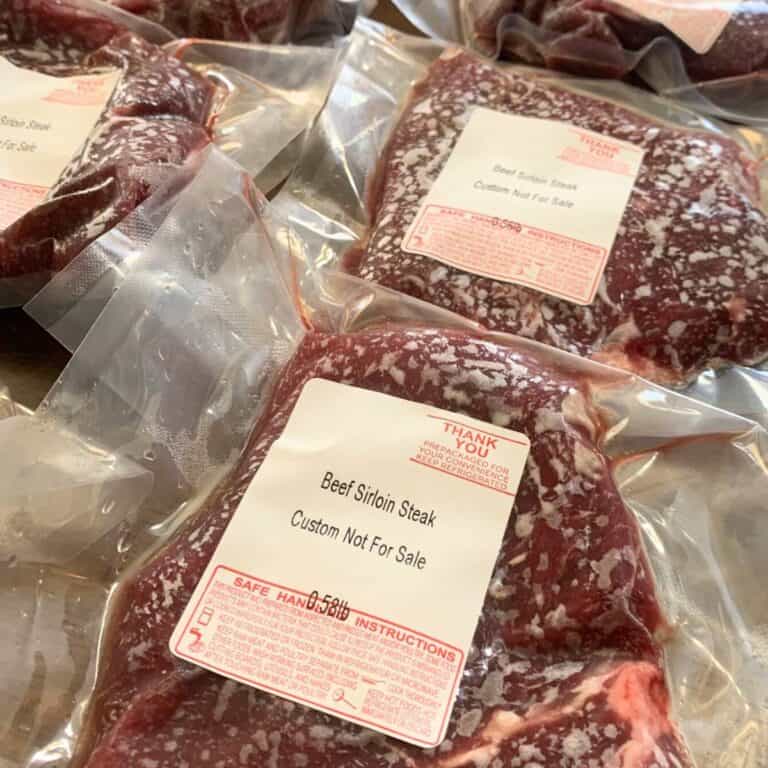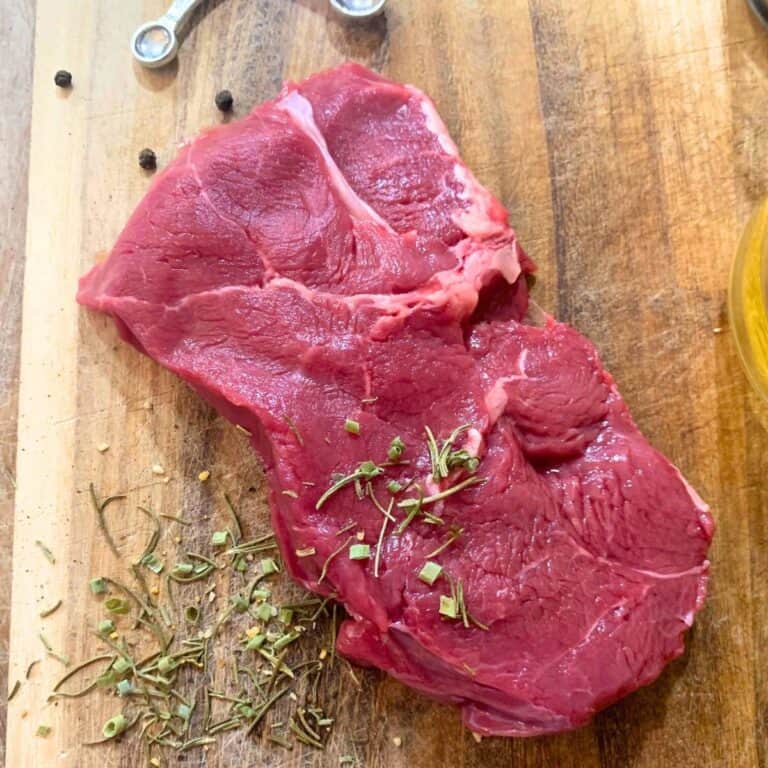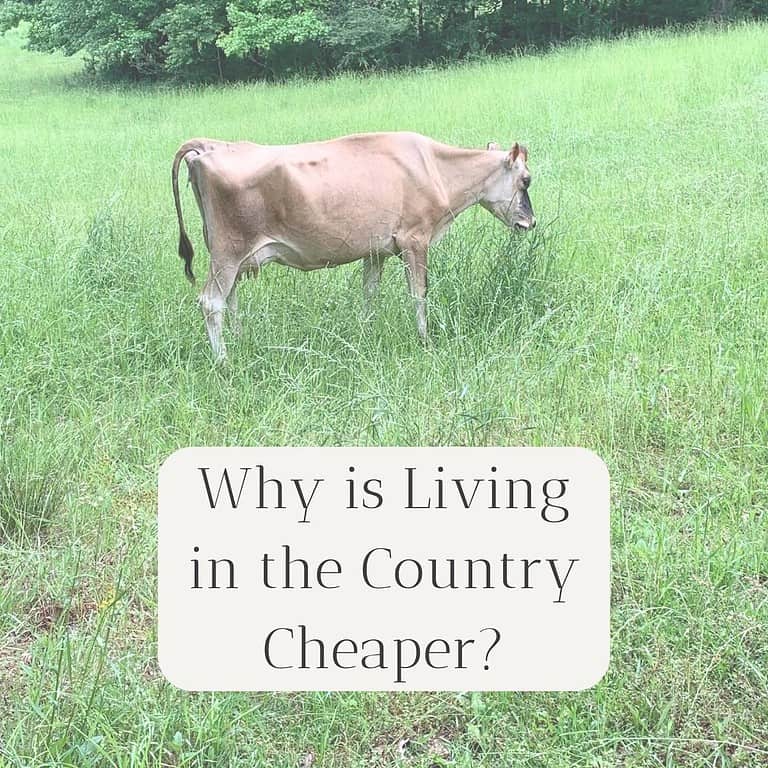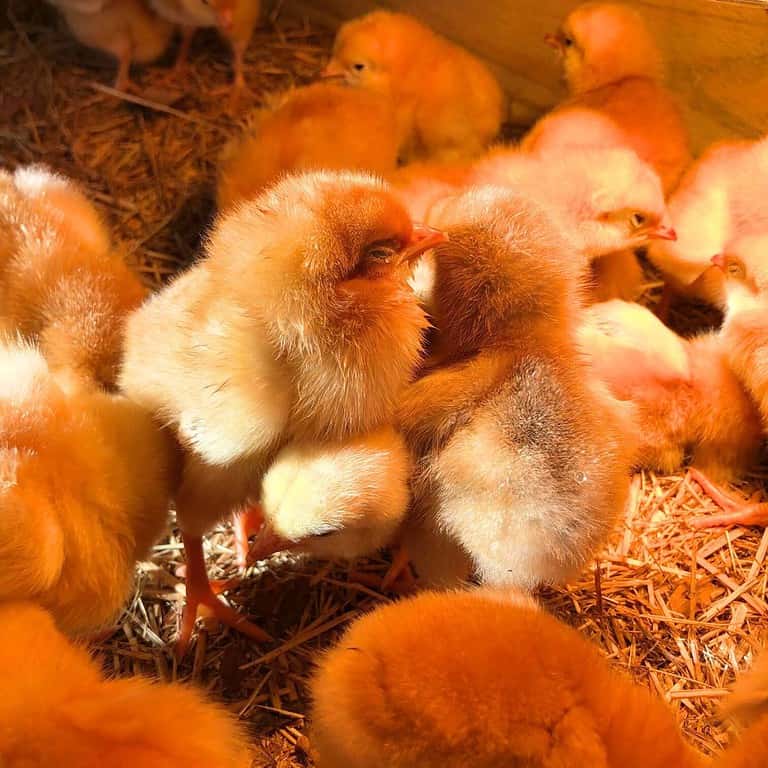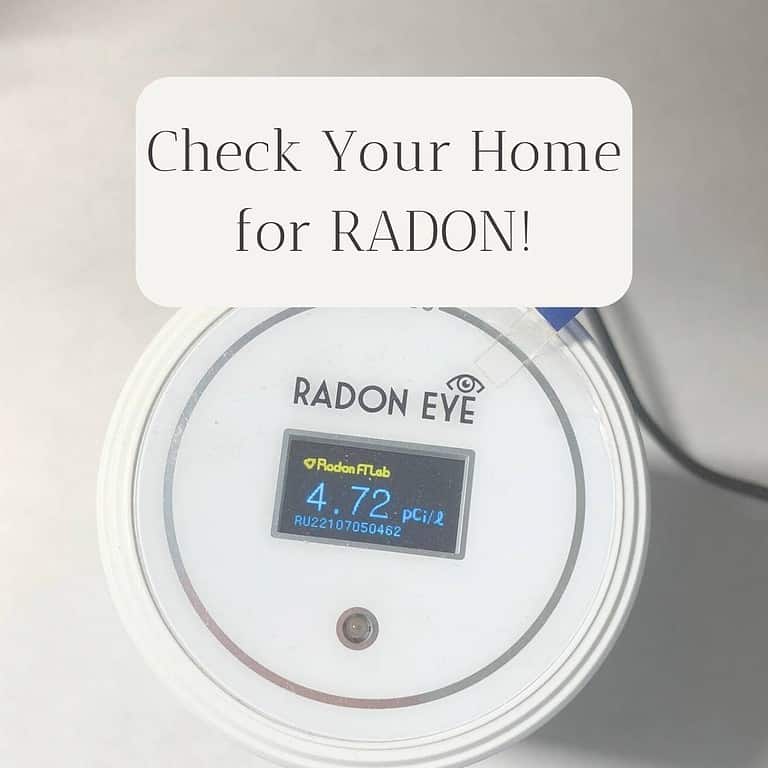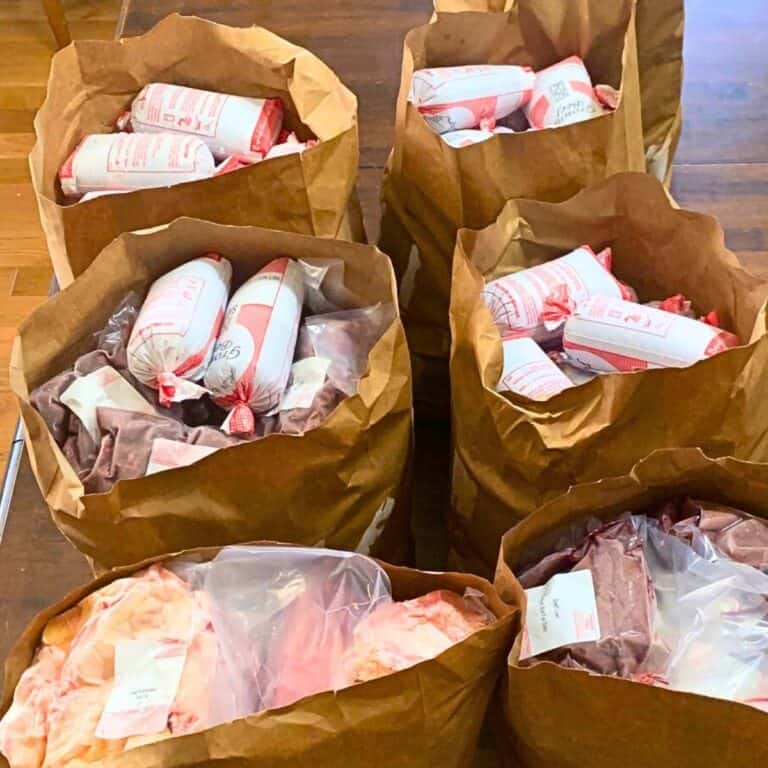Homestead Risk Assessment (Free Tool)
The Homestead Risk Assessment is a tool to measure how vulnerable you, your family, and your homestead are to internal and external disruptions. Take the free quiz and find out your risk score so that you can take steps to mitigate your risk and improve your overall preparedness!
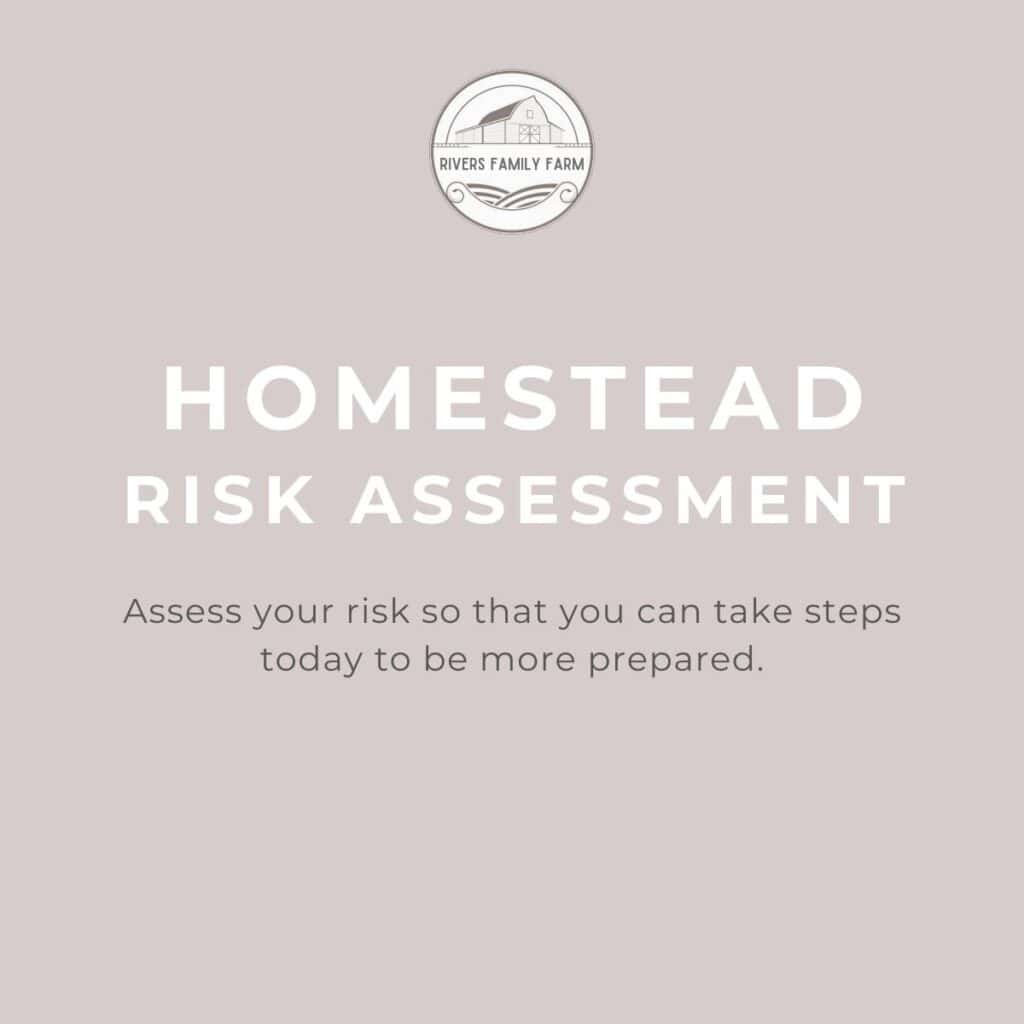
I’ve been an auditor for almost 20 years, and the last few years have been spent doing risk assessments. Then it occurred to me that it might be helpful if I put together a risk assessment for homesteaders!
I have been playing around with this idea for a long time, but I’m excited to offer you something that I hope will bring value to you.
I developed a short homestead risk assessment quiz so that you can find your gaps and vulnerabilities. Once you know your risk score, you can take steps to start mitigating your risks and become better prepared for whatever life throws your way!
If you try it, I’d be honored to know what you think. Leave a comment and let me know!
What is a Homestead Risk Assessment?
At its core, a Homestead Risk Assessment is a tool to measure how vulnerable you, your family, and your homestead are to internal and external disruptions. Think along the lines of bad weather, job loss, predation, power grid disruptions, water system disruptions, economic disruptions, and other similar scenarios.
For example, if you or your spouse lose a job, or if terrible weather hits your homestead, how would you fare? Could you pay your bills? Or if the water company and electric company quit supplying you with water and electricity, would you be able to use other systems?
Every family prepares differently. Pray about it, talk it over with your family, and do what feels right to you.
Homestead Risk Assessment (Free Tool)
Take this short, free quiz and find out your risk score so that you can take steps to mitigate your risk!
The six main risk areas that the quiz evaluates are: Shelter, Water, Food, Remedies, Hygiene, and Security. And within the six main risk areas are several sub-risk areas. But I don’t want to get too technical here and end up in the weeds.
Dimensions of Homestead Risk
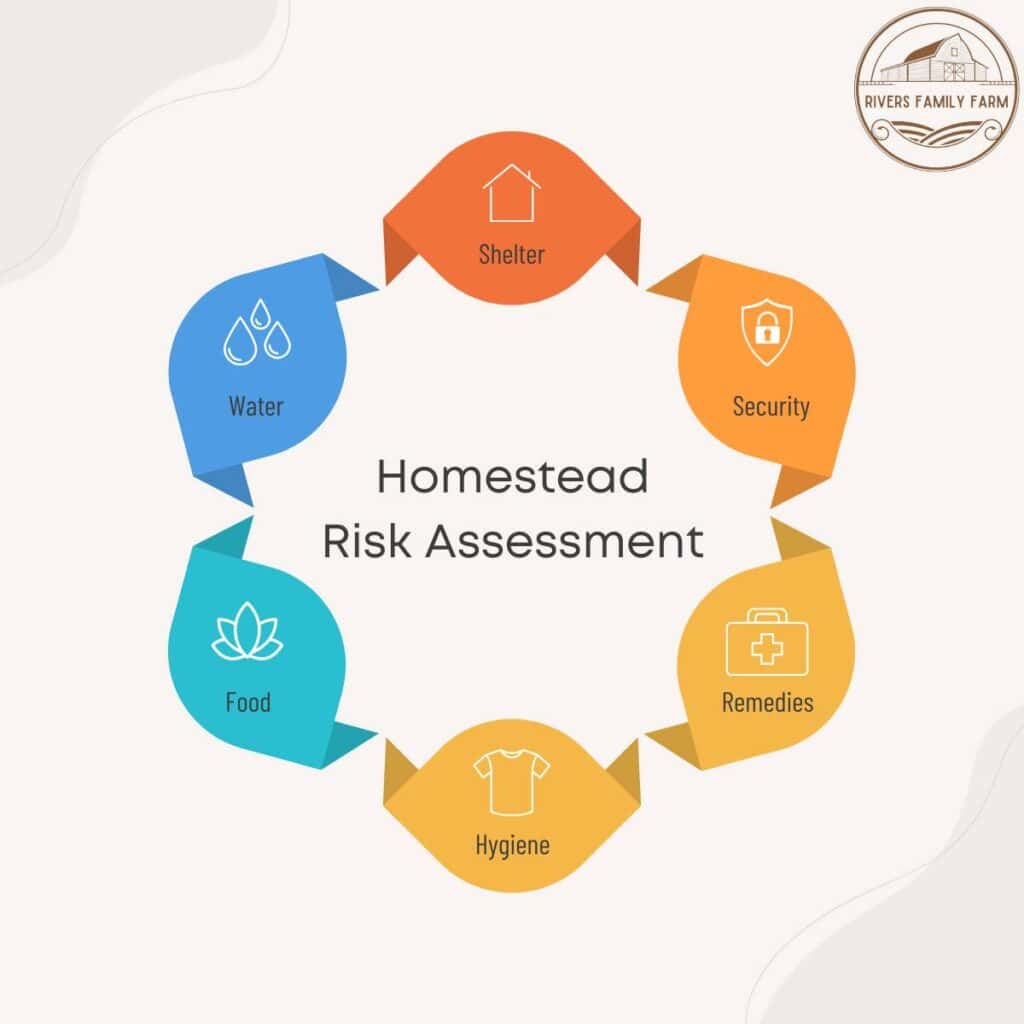
Shelter
Measuring the risk associated with your shelter is crucial. This applies to people shelters and animal shelters, along with transportation.
Debt-free home – Your home won’t bring you much peace if it belongs to the bank. Try to make extra payments to get it paid off early or move to a more affordable home. That way it will be your sanctuary and not your source of stress or anxiety when Murphy comes to visit.
Barns and coops – Although barns are not necessary if you don’t have bad winters or animals that need a large barn, it is a consideration for others that do.
Heating and cooling – You need to be able to heat and cool your home. Maybe you have a wood-burning fireplace to use during the winter. Perhaps you have ponds to cool you down or battery-operated fans to use during summer.
Home maintenance skills – Strive to learn all the skills you need to be able to repair burst water pipes; fix broken doors, walls, and windows; and patch a leaky roof.
Transportation – Are your human and animal vehicles paid for or do you have debt? Do you have the skills and tools required to do maintenance and make repairs? If gas was too expensive or not available, how would you get around? Would you need to get around or could you stay put for a few months?
Water
Water is essential on your homestead.
Collection – How can you get water without relying on the city or county water? You can dig ponds, dam a stream, or dig a well. You can also capture rainwater.
Filtration – How will you filter and purify the water you collect? There are a lot of filter options available. You can also boil your water.
Storage – How will you store your water? Do you have cisterns or barrels you can use? Or is your water stored in a pond or creek?
Tools – How will you run water to your garden and livestock? Can you make repairs with what you have on hand?
Food
People and animals won’t last long without access to clean food.
Garden – Do you grow a garden? Learning the skills to grow your own fruit and vegetables will take you a long way. Do you grow enough food for your pets, livestock, and poultry?
Forage – Do you know what grows wild near you and what’s safe to eat?
Cook – How will you cook a meal if the power goes out? Do you have manual kitchen appliances?
Preserve – Do you have everything you need to preserve what you grow and produce on your homestead?
Seeds – Do you have a backup supply of seeds for the next growing season? Do you know how to save and store seeds for future years?
Livestock – Do you raise cows, goats, pigs, sheep, or other livestock? Do you have good animal husbandry skills? Do you have a closed-loop system so that you don’t need any outside inputs?
Hunt – Do you have the skill to hunt for food? You don’t necessarily have to use a gun with bullets. You could use traps, nets, and bows and arrows.
Storage – How do you store your food so that it lasts a long time? Do you use oxygen absorbers and moisture absorbers in your dry goods?
Hygiene
Prevent illness and injury through cleanliness. Cleanliness also lifts the soul and spirit.
Soap – Do you know how to make soap? Do you have or raise the ingredients you need to make soap?
Vinegar – Do you know how to make vinegar? A cheap and simple vinegar and water solution kills most viruses, germs and bacteria.
Laundry – Do you have what you need to clean your clothes without electricity?
Sewage – Do you know how to do maintenance on your septic system? Do you have alternate methods to deal with sewage?
Waste – What would you do with your trash if the trash company stopped coming to your house? Do you know how to recycle and reuse what you have? Do you use reusable items that will last a long time?
Dental care – Do you know how to make your own dental products like toothpaste and mouthwash?
Hair care – Do you know how to make your own hair products like shampoo and conditioner?
Body care – Do you have what you need and know how to make your own deodorant, salves, balms, and lip treatments? Can you prevent sunburns by making your own sunscreen?
Remedies
Treat illness and injury in your family and animals by making your own medicine and remedies.
Immune system – Do you know what you can do to boost your immune system and do you do those things? Walking outside barefoot, meditating with the red morning sun hitting your skin, getting enough sleep at night, and eating fermented foods are all cheap and easy ways to boost your immunity.
Medicinal herbs – Do you grow medicinal herbs? Do you know how to prepare herbal remedies like salves, balms, tinctures, teas, and syrups?
Acute conditions – Do you have a basic first aid kit? Do you know how to treat acute conditions like a broken arm, bleeding gash, or flu? What about in your animals?
Chronic conditions – Do you have books with herbal remedies for chronic conditions like arthritis and high blood pressure? If you ran out of prescription medication, what would you do?
Security
How will you keep your livestock and family safe and secure? How will you protect your shelter, water, food, hygiene, and remedies?
Weapons – Do you have weapons to protect your family and livestock from lethal predators? Are your weapons stored safely?
Perimeter fencing – This will keep predators out and livestock in. Do you have the tools and skills necessary to make repairs to your fencing and cross fencing?
Community – Have you developed a community of friends and neighbors that can assist you if something happens to your water or other systems? Or could the community you live in be a threat to your family, property, and systems?
Environment – Are your immediate surroundings a threat to your safety or an asset? Are you secluded from prying eyes? Or do you live in the middle of a dry forest that could go up in flames? What natural disasters are possible in your area and how would you navigate them?
How to Read Your Risk Assessment Score
Just like in school, the high score of 100 is what you want to aim for.
Low Risk
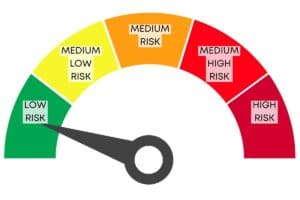
If your score is between 90 – 100, Great Job! You have done some great things to prepare yourself, your family, and your homestead for future disruptions!! And it’s clear that you are a risk-averse person, because ending up in the low risk category doesn’t happen by accident.
By future-proofing your homestead, you have a low risk of being negatively impacted whenever internal or external disruptions hit you. Great job!
Medium-Low Risk
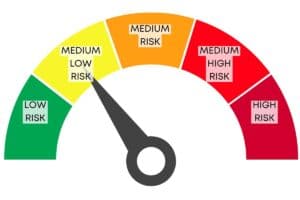
If your score is between 80 – 89, Not Bad! You have done a pretty good job of preparing yourself, your family, and your homestead. It is clear that you are a risk-averse person (not the least of which because you took the time to take the quiz), because ending up in the medium-low risk category doesn’t happen by accident.
But there is some room left for improvement that you may want to consider so that you can mitigate your risk even more. But overall, not bad!
Medium Risk
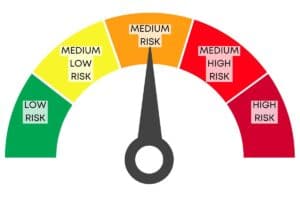
If your score is between 70 – 79, you need to prioritize and work on the systems that will have the biggest positive impact for you, your family, and your homestead.
You have medium risk that whenever life happens and someone or something throws a wrench your way, you’ll have a bad day. In other words, you have a 50% chance that any problem you face could wreck your homestead dreams and turn it into a nightmare.
But the good news is that you can take steps today to greatly improve your risk score! Chances are, just a few minor changes will put you into a better category.
Medium-High Risk
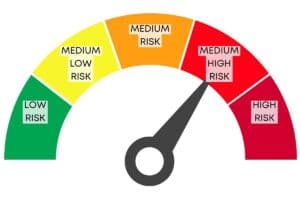
If your score is between 60 – 69, you have some pretty big weaknesses in your systems that you need to deal with.
When life happens, you have medium-high risk that you, your family, and your homestead will experience some big setbacks. When Murphy comes to visit, you won’t have the bandwidth to deal with the problem easily. To fix the problem will take some pretty big adjustments and work on your and your family’s part.
The good news is that you can take steps today to improve your risk score! I want to encourage you to look at where you are least prepared and start taking baby steps to improve your preparedness. It doesn’t take that much to get you into the medium or medium-low risk categories!
High Risk
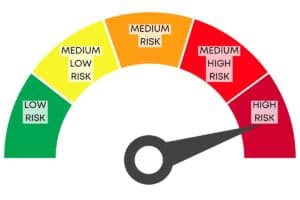
If your score is less than 60, you have some major vulnerabilities and weaknesses that you need to deal with.
When life happens, you have a high risk that you, your family, and your homestead will experience some major setbacks. If one of your animals gets sick, you may not have the time, money, or know-how to treat it. If a storm comes through and disrupts your power, you may lose all the food in your refrigerator and freezer if you don’t have a generator.
But don’t be discouraged! Be proactive!! Take steps starting today, this week, this month, and this year to improve your risk score. Make the changes you need to make. Before you know it, your score will be a lot better!
Pin It For Later!
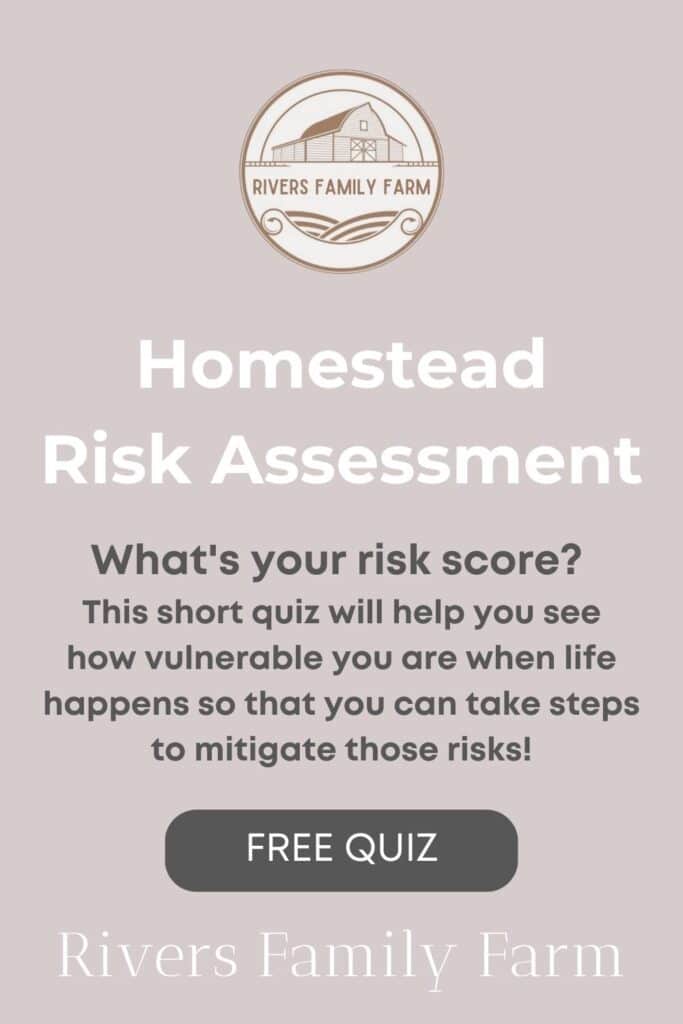
Other Related Posts
How to Start Homesteading: 20 Practical Steps

